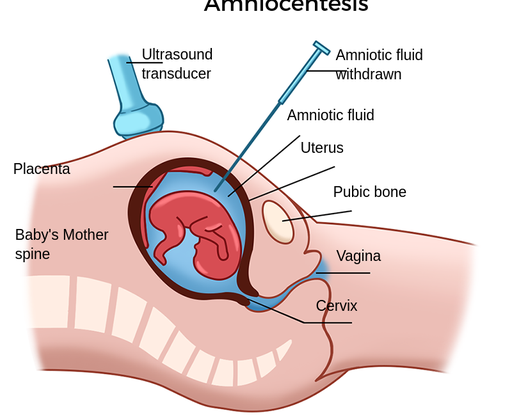A nurse is caring for a client following a vaginal delivery of a term fetal demise. Which of the following statements should the nurse make?
you can bathe and dress your baby if you'd like to
I'm sure you will be able to have another baby when you’re ready
You should name the baby so she can have an identity
If you don’t hold the baby, it will make letting go much harder
The Correct Answer is A
A. "You can bathe and dress your baby if you'd like to": This statement acknowledges the client's autonomy and offers a sensitive and supportive approach. Allowing the client the option to participate in the care of the baby, such as bathing and dressing, respects the individual grieving process.
B. "I'm sure you will be able to have another baby when you’re ready": While the nurse may want to provide hope for the future, this statement might be perceived as minimizing the client's current grief and loss. It's essential to focus on the present and the client's emotions.
C. "You should name the baby so she can have an identity": Naming the baby is a personal choice, and the nurse should avoid directing the client on what they "should" do. Naming the baby can be a meaningful way for some parents to acknowledge the baby's existence and create memories.
D. "If you don’t hold the baby, it will make letting go much harder": Pressuring the client to hold the baby may not be appropriate, as individuals have different coping mechanisms. Some may find comfort in holding and spending time with the baby, while others may need more time before they are ready.
Nursing Test Bank
Naxlex Comprehensive Predictor Exams
Related Questions
Correct Answer is ["A","F"]
Explanation
In the context of a client at 32 weeks of gestation with complete placenta previa, the following assessment findings require immediate follow-up:
A. Fetal heart rate:
Explanation: An elevated fetal heart rate (174/min) may be indicative of fetal distress. This finding requires immediate follow-up to assess the well-being of the fetus.
F. Vaginal bleeding:
Explanation: A moderate amount of bright red vaginal bleeding is a concerning sign, especially in the context of complete placenta previa. It indicates active bleeding, and immediate follow-up is necessary to assess the severity of the situation and the well-being of both the mother and the fetus.
C & D. Hemoglobin (Hgb) and Hematocrit (Hct):
Explanation: Hemoglobin and hematocrit levels are important indicators of blood loss. Given the vaginal bleeding, these values need immediate follow-up to assess the extent of maternal blood loss and the potential need for blood transfusion.
The following assessment findings do not require immediate follow-up in the given context:
B. Fundal height:
Explanation: Fundal height (33cm) is typically measured to assess fetal growth. While it's important to monitor, it may not be an immediate concern unless there are other signs of fetal distress.
E. Platelet count:
Explanation: While platelet count is important, it may not require immediate follow-up unless there is evidence of severe bleeding and a potential risk of disseminated intravascular coagulation (DIC). In this scenario, attention to Hgb and Hct is more urgent.
G & H. White Blood Cell (WBC) count and Red Blood Cell (RBC) count:
Explanation: WBC count and RBC count may be monitored but do not require immediate follow-up unless there are signs of infection or other complications not evident in the given information.
Correct Answer is D
Explanation
A. "You cannot have an amniocentesis until you are at least 35 years of age": This statement is not accurate. While advanced maternal age (35 years or older) is often a factor considered for offering amniocentesis due to the increased risk of chromosomal abnormalities, it is not the only factor. Amniocentesis may be recommended for various medical reasons, such as a history of genetic disorders or abnormal prenatal screening results.
B. "We can schedule the procedure for later today if you'd like": The decision to undergo amniocentesis should not be made lightly, and it is typically based on medical indications or concerns. Immediate scheduling without a medical reason is not appropriate. Informed consent and discussion with the healthcare provider about the risks and benefits of the procedure are essential.
C. "Your provider will schedule a chorionic villus sampling to determine the sex of your baby": Chorionic villus sampling (CVS) is a different prenatal diagnostic procedure used to obtain a small sample of placental tissue for genetic testing. It is not typically used solely for determining the sex of the baby. Amniocentesis is the procedure commonly used for both genetic testing and determining the sex of the fetus.
D. "This procedure determines if your baby has genetic or congenital disorders": This is the most appropriate response. Amniocentesis is a diagnostic procedure that involves the removal of a small amount of amniotic fluid for analysis. It is commonly used to assess the risk of genetic and congenital disorders, including chromosomal abnormalities.

Whether you are a student looking to ace your exams or a practicing nurse seeking to enhance your expertise , our nursing education contents will empower you with the confidence and competence to make a difference in the lives of patients and become a respected leader in the healthcare field.
Visit Naxlex, invest in your future and unlock endless possibilities with our unparalleled nursing education contents today
Report Wrong Answer on the Current Question
Do you disagree with the answer? If yes, what is your expected answer? Explain.
Kindly be descriptive with the issue you are facing.
